nextnano3 - Tutorial
next generation 3D nano device simulator
1D Tutorial
Strained AlAs QW - Crossover of ground states
Author:
Stefan Birner
If you want to obtain the input files that are used within this tutorial, please
check if you can find them in the installation directory.
If you cannot find them, please submit a
Support Ticket.
-> 1DAlAs_QW_4nm_001.in
-> 1DAlAs_QW_8nm_001.in
-> 1DAlAs_QW_4nm_011.in
-> 1DAlAs_QW_8nm_011.in
-> 1DAlAs_QW_4nm_111.in
Strained AlAs QW along [001] - Crossover of ground states
-> 1DAlAs_QW_4nm_001.in
-> 1DAlAs_QW_8nm_001.in
Note: Please also have a
look at this tutorial: AlAs QW crossover
II
Conduction band edges and wave functions
The following figures show the conduction band edges at the X point for AlAs(001)
QWs embedded within GaAs.
The square of the wave functions (psi2) - shifted by their energies -
are shown for a 4 nm and 8 nm quantum well.
The X band in AlAs is split due to compressive strain with respect to the
GaAs(001) substrate.
The Xxy band is two-fold degenerate (2 valleys at the X point).
==> mDOS = (ml mt)1/2
The Xz band is non-degenerate (1 valley at the
X point). ==> mDOS
= (mt mt)1/2 = mt
The Xz and Xxy
valleys are separated due to strain by 21.6 meV.
The GaAs barriers are unstrained.
Only the two lowest confined wave functions are shown.
 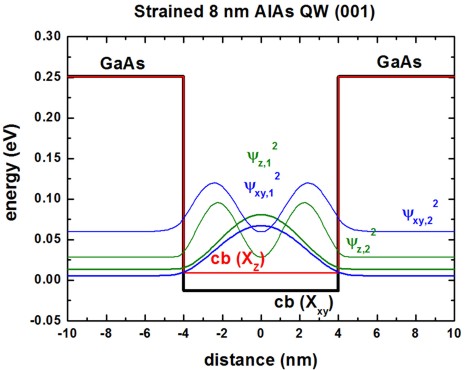
The longitudinal mass ml is heavier in AlAs than the transverse
masses mt.
Consequently, one expects the ground state to be determined by the heavier
longitudinal mass.
However, this is true only for QWs smaller than 6 nm.
For larger QW widths, the ground state is due to the other two valleys because
here, the fact that these conduction band edges are the lowest in energy
dominates.
The following figure shows the energy spectrum of a strained AlAs(001) QW as a
function of QW width.
Once can clearly see the crossing of the ground state
at a QW width of ~6 nm.
For the 10 nm QW, 4 states of the Xxy
valleys and 8 states of the Xz
valleys are confined in the quantum well
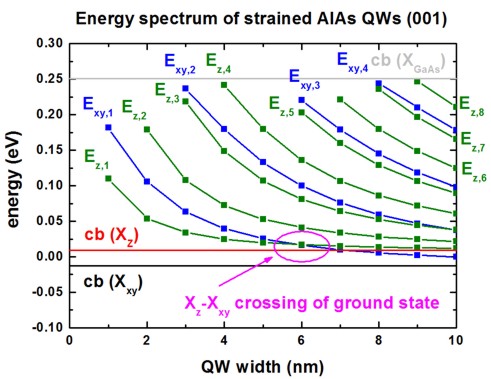
Material parameters
$numeric-control
...
lattice-constants-temp-coeff-on = yes !
temperature dependent lattice constants
$global-parameters
lattice-temperature = 1d0 ! [K] 1
Kelvin
T = 1 K, i.e. lattice constants are calculated for 1 K:
==> GaAs: 0.5642 nm
==> AlAs: 0.5652 nm
These calculated values can be found in this file:
lattice_constants1D.dat
- X band conduction band offset (CBO) GaAs/AlAs (unstrained): 0.251
eV =
3.441 - 3.190
GaAs
conduction-band-energies = ... ...
3.441d0 ! [eV] Gamma, L, X
conduction-band-energies = ... ...
3.190d0 ! [eV] Gamma, L, X
-3.190
so that the unstrained AlAs band edge is located at 0 eV.
band-shift
= -3.190d0
! [eV]
- GaAs
conduction-band-masses = ...
! [m0] Gamma cb1 -
...
! [m0] L cb2 - - ml mt
mt
1.3d0 0.23d0 0.23d0 ! [m0] X
cb3 - 1st principal axis, 2nd, 3rd
- ml mt mt
AlAs
conduction-band-masses = ...
! [m0] Gamma cb1 -
...
! [m0] L cb2 - - ml mt
mt
0.97d0 0.22d0 0.22d0 ! [m0] X
cb3 - 1st principal axis, 2nd, 3rd
- ml mt mt
The mass tensor at the X conduction band edge is described with a
longitudinal mass and two transverse masses (ellipsoidal mass tensor).
Strained AlAs QW along [011] - Crossover of ground states
-> 1DAlAs_QW_4nm_011.in
-> 1DAlAs_QW_8nm_011.in
Here, we grow the AlAs QW along the [011] direction.
This will affect the strain tensor, the shifts and splittings of the X
conduction band edges and the orientation of the effective mass tensors of the
different valleys.
$domain-coordinates
!
...
growth-coordinate-axis = 0 0 1 !
!++++++++++++++++++++ (011) surface
+++++++++++++++++++++++++++++++++++++++++
hkl-x-direction-zb = 1 0 0 !
along the [100] direction in the crystal coordinate system
hkl-y-direction-zb = 0 1 -1 !
!hkl-z-direction-zb = 0 1 1 !
!++++++++++++++++++++ (011) surface
+++++++++++++++++++++++++++++++++++++++++
Conduction band edges and wave functions
The following figures show the conduction band edges at the X point for AlAs(011)
QWs embedded within GaAs.
The square of the wave functions (psi2) - shifted by their energies -
are shown for a 4 nm and 8 nm quantum well.
The X band in AlAs is split due to compressive strain with respect to the
GaAs(011) substrate.
The Xx band is not degenerate (1 valley at the X point).
==> mDOS = (ml mt)1/2
The Xyz band is two-fold degenerate (2 valleys at the
X point). ==> mDOS
= (mt mt)1/2 = mt
The Xyz and Xx
valleys are separated due to strain by 9.4 meV, so this is only half as much as
for the (001) case.
The GaAs barriers are unstrained.
Only the two lowest confined wave functions are shown.
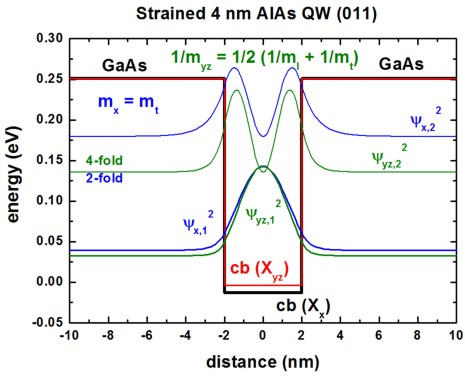 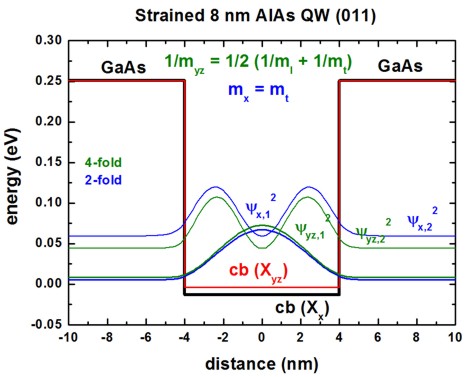
We now have different mass tensors compared to the (001) QW.
For the confinement direction z, the following mass tensor components are
relevant for the Schrödinger equation:
AlAs: cb(Xx): 1/mzz(011) = 1/mt = 1 /
0.22
AlAs: cb(Xyz): 1/mzz(011) = 1 / 2 ( 1/ml
+ 1/mt ) = 1 / 0.359
The mass for the two Xyz band edges is heavier than the transverse
masses mt that is relevant for the Xyz band edge.
Consequently, one expects the ground state to be determined by the heavier
mass.
However, this is true only for QWs smaller than 6 nm.
For larger QW widths, the ground state is due to the other valley because
here, the fact that this conduction band edge is the lowest in energy
dominates.
The following figure shows the energy spectrum of a strained AlAs(011) QW as a
function of QW width.
Once can clearly see the crossing of the ground state
at a QW width of ~6 nm.
For the 10 nm QW, 4 states of the Xx
valley and 5 states of the Xyz
valleys are confined in the quantum well
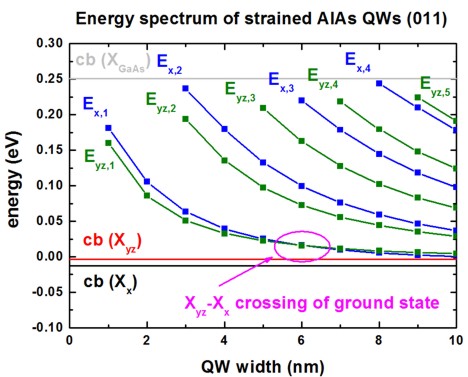
When comparing the mass tensors for (001) and (011), one can see that the mass
tensor became more "isotropic" for the (011) QW (but it is still ellipsoidal).
This fact can also be seen in the energy spectrum.
Strained AlAs QW along [111] - Crossover of ground states
-> 1DAlAs_QW_4nm_111.in
Note: For strained heterostructures grown along the [111]
growth direction piezoelectric fields are present! This has been neglected in
this tutorial.
The following figure shows the conduction band profile and the lowest two
wave functions (psi2) for the 4 nm AlAs QW grown along the [111]
direction.
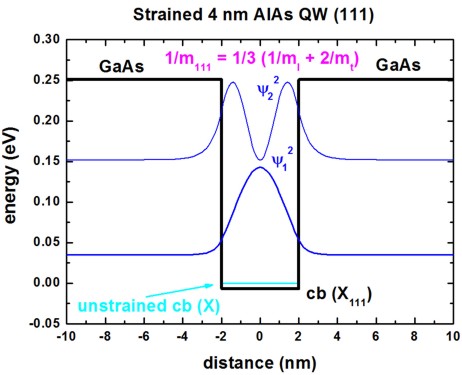
For the [111] growth direction, the three X band edges are degenerate.
In that case a crossover cannot be observed as each eigenvalue is three-fold
degenerate.
AlAs: cb(X111): 1/mzz(111) = 1 / 3 ( 1/ml
+ 2/mt ) = 1 / 0.296
The component 1/mzz for each grid point can be found in this file:
Schroedinger_1band/mass_tensor1D_cb003_qc001_sg001_deg001.dat
The following figure shows the relevant energy spectrum as a function of QW
width.
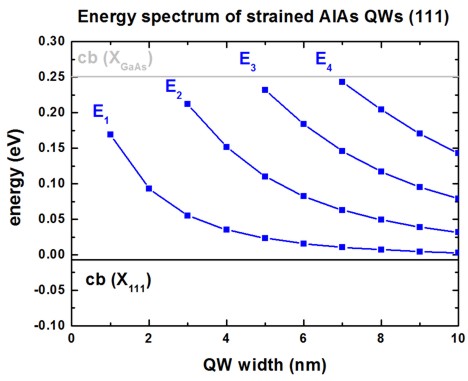
|